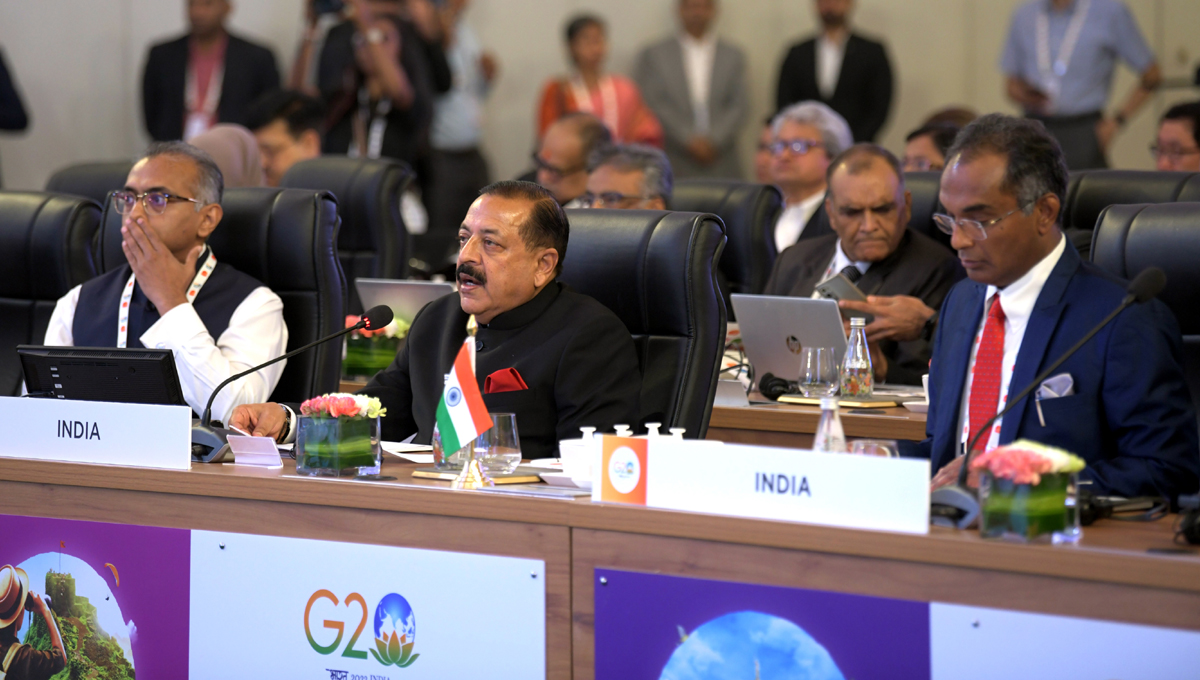
Excelsior Correspondent
MUMBAI, July 5: Union Minister of State (Independent Charge) Science & Technology; MoS PMO, Personnel, Public Grievances, Pensions, Atomic Energy and Space, Dr Jitendra Singh today asked the G20 countries to “rise above differences” and address global challenges confronting the world and also act as G20 member responsive for global well-being in the spirit of one family.
In his inaugural address at the G20 Science Ministers meeting here , Dr Jitendra Singh said, India recognizes the significance of international collaboration and knowledge sharing in addressing the complex challenges of our times and Prime Minister Narendra Modi has been repeatedly reiterating this from time to time at every international forum.
India’s Science Minister called upon to leverage the collective wisdom, expertise, and resources to foster a culture of innovation, promote sustainable development, and ensure a prosperous future for all. The Minister urged the G20 nations to move ahead with a profound agenda to excel in inclusive, equitable and sustainable growth.
Referring to the fact that a number of Member States are represented at the highest level in their national science hierarchy, Dr Jitendra Singh said, this group has potential to address major global challenges, as we did recently while combating Covid pandemic. He emphasized that during India’s G20 Presidency, we stand committed to advancing global research and innovation for a better tomorrow.
Dr Jitendra Singh said, as the world grapples with the challenges of climate change and depleting natural resources, it becomes imperative to harness renewable energy sources efficiently. He emphasized that G-20 members should remain committed to our Net Zero goals and continue to work on sustainable development and renewable energy and expressed satisfaction that the world has witnessed substantial growth in solar and wind power installations in recent years. Our scientists have been working tirelessly to discover and create materials that can revolutionise the energy sector, making it cleaner, more affordable, and accessible for all, the Minister added.
Dr Jitendra Singh underscored that G20 nations must harness the power of technology and innovation to drive the transition towards cleaner energy sources and promote eco-innovations, such as smart grids, energy-efficient buildings, and sustainable transportation systems, as these initiatives not only mitigate environmental impact but also foster economic growth and create new avenues for job creation.
Dr Jitendra Singh also pointed out that G-20 community has advanced space technologies to predict and monitor various natural hazards, like cyclone, tsunami, landslides, forest fire, space technologies also help a lot in communication. He underlined the need to share products of these technologies to countries, outside G-20 also, so that they can better prepare themselves against such calamities.
India’s Science Minister told the delegates that developing quantum technologies, exploring quantum communication, cryptography, and quantum algorithms are our next level of G-20 research agenda. We aim to scale up scientific and industrial R&D, for accelerating Quantum Technology-led economic growth and leverage several economies into a leading nation supporting sustainable development, he added.
Dr Jitendra Singh said, during these testing times, the world also witnessed rise of several technologies based startups and these companies excelled in developing AI-based solutions for various sectors, including healthcare, finance, agriculture, and education. He added that the integration of AI and data analytics has helped improve decision-making processes, enhance productivity, and drive innovation in diverse industries.
Dr Jitendra Singh drew the attention of G20 delegates towards the immense potential of our oceans and seas, in terms of mineral resources, energy solutions and marine food and asserted that all are committed to promoting sustainable practices in fisheries, marine research, coastal tourism, and renewable energy generation.
He said, by harnessing the potential of the Blue Economy, we can ensure the well-being of our oceans while driving economic development in a sustainable and responsible manner. We are also concerned about increased plastics and microplastics in our oceans, another important area to focus as it enters into our food chain as several marine organisms consume them.
In his concluding remarks at G20 Research Ministers Meeting, Dr Jitendra Singh expressed satisfaction that during the RIIG meetings, member states discussed various topics including, challenges related to energy materials & devices, solar energy utilisation and photovoltaic technology and materials and processes for green energy; and policy issues like role of research, development & innovation in creating new resource-efficient, sustainable and more circular bio-based technologies, products and services; understanding the blue economy science & services; blue economy sectors and opportunities; observation data and information services; marine ecosystems & pollution; blue economy management and perspectives; coastal and marine spatial planning; marine living resources and biodiversity; deep sea ocean technology; and blue economy policy perspectives.

